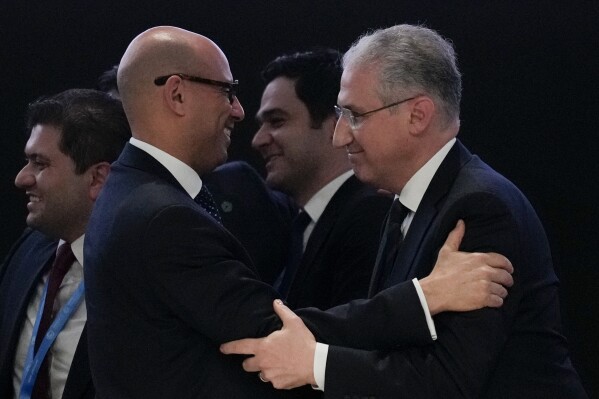Shocking $300B Climate Deal Ignites Fierce Debates at UN Summit – Here’s What You Need to Know
The United Nations climate talks concluded with an agreement to provide at least $300 billion per year to combat climate change. The funding is intended to support developing countries in addressing the devastating effects of global warming, following intense and contentious negotiations.
The United Nations climate talks have resulted in a groundbreaking agreement to allocate at least $300 billion annually to address the global fight against climate change. This substantial funding aims to assist developing nations in managing and mitigating the severe impacts of global warming, such as rising sea levels, extreme weather events, and shifting ecosystems. The deal, reached after intense and sometimes contentious negotiations, underscores the growing urgency to address the inequities in climate vulnerability.
While wealthier nations are often better equipped to adapt, developing countries face disproportionate challenges and are in dire need of financial support to implement climate resilience measures. This agreement is seen as a significant step towards fostering global cooperation in tackling the climate crisis, although it has also sparked debate over the adequacy and implementation of such funding commitments.

The recent United Nations climate summit culminated in a contentious agreement to allocate at least $300 billion annually to assist developing nations in addressing the escalating impacts of climate change. This funding, intended to help these nations transition away from coal, oil, and gas, adapt to future climate challenges, and manage damage from extreme weather, represents a significant increase from the $100 billion annual commitment made in 2009, which is set to expire. However, it falls far short of the $1.3 trillion that developing countries had sought, leaving many delegations dissatisfied despite acknowledging that the deal marks progress.
The agreement was reached in a tense and polarized environment, with COP29 President Mukhtar Babayev abruptly gaveling the deal into acceptance before countries had an opportunity to voice their opinions. When nations finally took the floor, many expressed their anger and disappointment, accusing the process of being unfair and criticizing the wealthier nations for not contributing enough.
India’s negotiator, Chandni Raina, was among the most vocal critics, labeling the deal a “paltry sum” and outright rejecting it, a stance that drew cheers from other delegates. Speaking to reporters, Raina declared her loss of faith in the United Nations system and condemned the methods used to finalize the agreement. A chorus of other nations echoed these sentiments, with Nigeria’s representative, Nkiruka Maduekwe, calling the deal “an insult and a joke,” and Panama’s Juan Carlos Monterrey expressing disappointment while acknowledging minor adjustments that made the agreement somewhat more acceptable, such as the inclusion of the phrase “at least” before the $300 billion figure and a provision for revisions by 2030.
Evans Davie Njewa of Malawi, representing nearly 50 of the world’s poorest nations, expressed reservations about the deal, while Cedric Schuster of the Alliance of Small Island States shared tempered support, emphasizing the need for the process to protect vulnerable populations.
United Nations Secretary-General António Guterres also expressed reservations, describing the deal as a “base on which to build” but falling short of the ambition he had hoped for. Meanwhile, some leaders found reasons to celebrate. European Union climate chief Wopke Hoekstra called it the beginning of a “new era” in climate financing, though activists attempted to disrupt his speech. Ireland’s environment minister, Eamon Ryan, referred to the agreement as a “huge relief,” noting the challenges of negotiating in a time of global division and crisis. Simon Stiell, Executive Secretary of the U.N. Climate Change body, likened the deal to an “insurance policy for humanity,” but warned it would only be effective if funding commitments were met fully and promptly.
The $300 billion commitment is seen as a starting point, with advocates like World Resources Institute President Ani Dasgupta calling it a “down payment” toward a safer and more equitable future. The hope is that this initial funding will encourage further contributions from private investors and multilateral development banks. However, concerns persist that relying on loans rather than grants could deepen the debt burdens of already struggling nations.
While the final figure exceeded earlier drafts that proposed $250 billion, it remains far below the $1.3 trillion demanded by developing countries. Many worry this shortfall will hinder progress toward meeting the targets of the 2015 Paris Agreement, which aims to limit global warming to 1.5°C above pre-industrial levels. The world is already nearing 1.3°C of warming, with emissions continuing to rise.
The summit also saw the adoption of Article 6, a mechanism under the Paris Agreement designed to create carbon markets that allow nations to trade pollution rights. Proponents argue that a U.N.-backed carbon market could generate up to $250 billion annually in additional climate funding. However, critics, including Greenpeace and the Indigenous Environmental Network, warn that the new rules are rife with loopholes and could be exploited by major polluters, undermining efforts to meet the 1.5°C target.
As the summit venue is dismantled, attention shifts to next year’s climate talks in Belém, Brazil, where many hope for more ambitious and inclusive outcomes. Despite the progress made, the divide between developed and developing nations remains stark, reflecting deep challenges in addressing climate change on a global scale.


Comments are closed, but trackbacks and pingbacks are open.